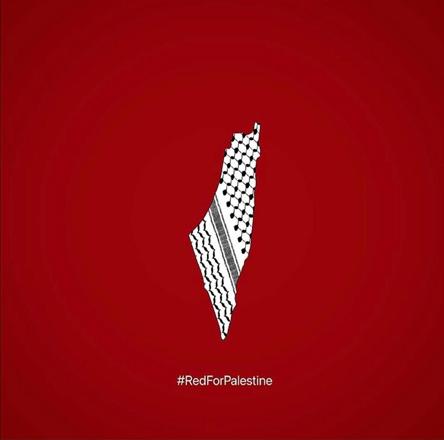- Local News
- Tue-2021-05-11 | 05:38 pm

Nayrouz News Agency :
Social media giants’ "orchestrated censorship of pro-Palestine content” has drawn an avalanche of criticism from social media users and activists amid the ongoing situation in the Palestinian Sheikh Jarrah neighbourhood of occupied East Jerusalem.
In remarks to The Jordan Times on Monday, Rama Z., a Palestinian-Jordanian Instagram user, said that many Arab content creators like Jordanian filmmaker Alla Hamdan have been going live on Instagram for several days now, hosting content creators of various fields to help spread the word about what is happening in the Palestinian neighbourhood, directly connecting with Palestinian activists and photographers documenting the "extreme settler violence in Palestine”.
Voicing solidarity with the Palestinian families of Sheikh Jarrah, Arabs together with people from different nationalities have waged campaigns and utilised "innovative activism”, Rama Z. said.
Rama Z., who also took part in a sit-in in Rabieh on Sunday in solidarity with Palestinians, noted that it is "our moral, historical, religious and national duty” to tell the world about what is "truly” happening in Palestine.
She alleged that Twitter and Facebook have suspended her accounts several times for posting pro-Palestine content.
Instagram administration has limited posts with "Al Aqsa” hashtags in Arabic amid Israeli attacks on Palestinian worshippers in Al Aqsa Mosque, claiming these posts violate community guidelines.
Instagram community guidelines cover intellectual property, inappropriate imagery, spam, illegal content, hate speech, bullying and abuse, self-injury, and graphic violence, which "if shared in relation to important and newsworthy events, and this image is shared to condemn or raise awareness and educate, it may be allowed”.
Later on, Instagram communications team said that the limited reach of posts was due to a technical problem, which is not related to any particular topic.
Meanwhile, court hearing on the Sheikh Jarrah case was postponed, which many activists said was "a tactic used by Israelis to distract the international community from the case and then commit the same atrocities against Palestinians”.
Salem Barahmeh, a Palestinian activist tweeted: "Do not be fooled, postponing Sheikh Jarrah court decision from Monday to an unknown date is an attempt to subdue the current uprising in Jerusalem.”
"A temporary delay is an extension of Israel’s decades long approach of incremental forcible displacement of Palestinians,” Barahmeh tweeted.
Massive numbers of people from all over the world have changed their profile pictures to red in solidarity with the Palestinian families of Sheikh Jarrah, voicing their objection to the discriminatory displacement of Palestinians, which is part of the continued Israeli settlement expansion.
Ru’a Mohammad, a 23-year-old Jordanian who also took part in the sit-in in Rabieh, told The Jordan Times that she contacted many of her friends reminding them to change their profile pictures to red.
She said that Instagram users she knows of have faced many difficulties on their accounts, in addition to restricting account activities.
"What social media giants do when it comes to Palestine offends the notion of free speech,” she said.
Sada Social Centre, a non-profit Palestinian youth initiative that was launched in an attempt to do justice to Palestine-related content that is subject to regular discrimination, recently documented more than 38 incidents of censorship of Palestine-related content, most of which (30 violations) were detected on Facebook, followed by two cases on Twitter and three on Instagram, in addition to other platforms.
A Human Rights Watch report issued in April stated that the deprivation Palestinians suffer is so severe that it amounts to the crimes against humanity of apartheid and persecution, showing that among the inhumane acts identified in either the Apartheid Convention or the Rome Statute are "forcible transfer,” and "expropriation of landed property”, which is currently the case in Sheikh Jarrah neighbourhood.
The Apartheid Convention defines apartheid as "inhumane acts committed for the purpose of establishing and maintaining domination by one racial group of persons over any other racial group of persons and systematically oppressing them”.
According to the report, the crime of apartheid under the Apartheid Convention and Rome Statute consists of three primary elements: An intent to maintain a system of domination by one racial group over another; systematic oppression by one racial group over another; and one or more inhumane acts, as defined, carried out on a widespread or systematic basis pursuant to those policies.
"Most states have agreed to treat the worst forms of such discrimination, that is, persecution and apartheid, as crimes against humanity, and have given the ICC the power to prosecute these crimes when national authorities are unable or unwilling to pursue them,” the report said.









